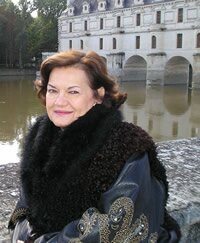Elisabeth Roudinesco

The Speaker
An historian holding a doctorate in Arts and Humanities, Elisabeth Roudinesco is president of the Société Internationale d’Histoire de la Psychiatrie et de la Psychanalyse (SIHPP), a contributor to the newspaper Le Monde since 1996, and an assistant professor at the Ecole Pratique des Hautes Etudes en Sciences Sociales (EHESS). Hers is a familiar face on TV screens, and she has succeeded in making contemporary psychoanalytical thought accessible.
Born in 1944, Elisabeth Roudinesco attended college at the Sorbonne, where she received her undergraduate degree in humanities, with a focus on linguistics. She completed her Masters with Tvzetan Todorov at the Université de Paris VIII-Vincennes, and she went on to do her doctoral dissertation with Jean Levaillant in 1975. A student of Gilles Deleuze and Michel de Certeau, she was a member of the Ecole freudienne de Paris (1969-1981), founded by Jacques Lacan, where she received her psychoanalytical training, and she served as part of the editorial staff for the journal Action poétique (1969-1979).
She was a contributor to Libération magazine for ten years, until 1996, and to the journal L'homme from 1997 to 2002. Beginning in 1997, she publicly took a stance in support of right of homosexual couples to adopt children, and has participated in numerous debates on the separation of church and state, cloning, genetics, nature versus nurture. She has criticized the collective judgment of INSERM, the Institut National de la Santé et de la Recherche Médicale, on psychotherapy. Openly opposed to the wearing of Muslim headscarves in public schools, she also rejects any form of affirmative action.
Her works have been translated into nearly 30 languages. Her most recent publications are La Famille en désordre (2002, Paris, Fayard) ; Philosophes dans la tourmente (2005, Paris, Fayard) et La part obscure de nous-mêmes - Une histoire des pervers (Albin Michel, Paris, 2007).
Lectures
Freud, penseur des Lumières sombres
This lecture focuses on showing that Freud was a progressive thinker drawing from the Enlightenment and science. It also shows that he was at the same time, heir to a critical tradition that introduced a malaise, or destructive force, at the heart of subjectivity, capable of annihilating humanity itself and that could be overcome only by reaffirming the necessity of civilization and democracy. Thus the idea that another idea might exist, contrary to the Enlightenment tradition, coming out of 18th century philosophy - that of pessimism, which called into question the ideals of happiness and linear progress.
The school of thought known as Lumières sombres (literally “dark lights”) is a tradition that is opposed to conservatism, obscurantism, as well as to scientistic illusions. In Freud’s work we find notions inherited from Nietzsche, whose works and thinking were best parsed by Theodor Adorno.
The origins of perversion
Where does perversion begin and who are the perverts? Since its first appearance in the Middle Ages, the term has referred to someone who takes pleasure in evil and the destruction of himself and others. But if the experience of perversion is universal, every era has different ways of perceiving and responding to it. In this genealogy of perversion, Elisabeth Roudinesco will address the different ways in which people in the West have determined who is a “pervert,” stressing particularly the 19th century designation of homosexuals, children who masturbate and hysterical women. For the modern era, these issues will be underscored through the question of Nazism and Luchino Visconti’s conception in Les damnés.
Through these analyses, Elisabeth Roudinesco will show how various aspects of perversion allow us to put into perspective a comparison of good and evil, the sublime and the dishonorable.
“Whether the perverse are sublime when they turn to art, creation or mysticism, or dishonorable when they give into their murderous instincts, they are a part of us, a part of our humanity, because they show what we never stop hiding: our own negativity, the dark part of ourselves.”
Differences between the sexes: history and theories
Since the first works of Freud, the question of the difference between the sexes has never stopped being debated between men and women within the psychoanalytical movement. The Viennese school – disciples of Freud – that supported the existence of a single libido shared by the two sexes and represented by women has been at odds with the English school of Ernest Jones and Melanie Klein who preferred to speak of a dualism: each sex had its own characteristics.
In France, between the World Wars, Marie Bonaparte engaged the debate, and then in 1949 it was Simone de Beauvoir, followed a few years later by Jacques Lacan who created a synthesis of the two camps. Such debates show to what extent psychoanalysis has been a battlefield for controversial questions such as sexuality and the difference between men and women. It is the same today, particularly in debates over homosexuality and issues of gender.
Host this lecture - Online forms
Host this lecture - Paper forms